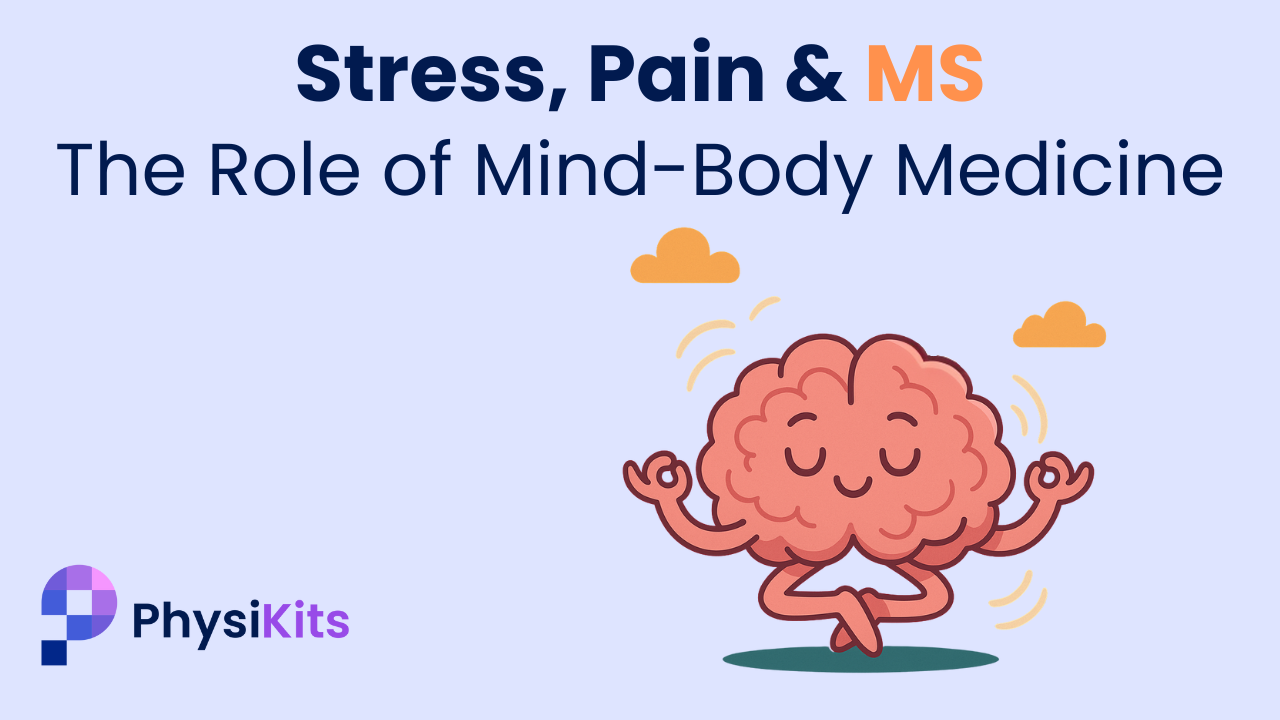
Stress, Pain & MS: The Role of Mind-Body Medicine
Aug 13, 2025Living with multiple sclerosis (MS) can feel like navigating a maze of symptoms—fatigue, muscle weakness, balance issues, and, for many, pain. Pain in MS is often one of the most disruptive challenges, yet it’s also one of the least understood. It can derail your day, sap your energy, and make even simple tasks feel overwhelming. But here’s the good news: science is revealing powerful ways to manage pain by tapping into the connection between your mind and body. In this blog, we’ll explore how stress and pain intertwine in MS and how mind-body medicine offers practical, evidence-based strategies to help you take control.
Understanding Pain in MS
Pain in MS isn’t a one-size-fits-all experience. It can stem from multiple sources, each with its own impact on your body. Here’s a breakdown of the main types:
-
Neuropathic Pain: This comes from damage to nerves in the brain or spinal cord, causing sensations like burning, stabbing, or electric shocks. It’s often described as intense and unpredictable.
-
Musculoskeletal Pain: Muscle weakness, altered posture, or imbalances from nerve damage can lead to aches, joint pain, or muscle spasms. For example, compensating for a weak leg might strain your back or hips.
-
Secondary Pain: Other MS symptoms, like stiffness, limited mobility, or bladder issues, can indirectly cause discomfort, adding to the pain burden.
Research by Scherder and colleagues (2018) shows that people with MS often have altered sensory processing, even before pain becomes noticeable. This means the nervous system might be primed to become overly sensitive to pain signals—a process called central sensitisation.
Over time, this heightened sensitivity can make pain feel more intense or persistent, even from minor triggers. Understanding this is key to finding effective ways to manage pain.
How Stress and Pain Amplify Each Other
Stress is more than just feeling overwhelmed—it’s a biological force that can amplify pain in MS. When you’re stressed, your body releases hormones like cortisol, which can increase inflammation, disrupt immune function, and make your nervous system more reactive. In MS, where the central nervous system is already vulnerable, this creates a “perfect storm” where stress and pain feed off each other.
Here’s how it works:
-
Central Sensitisation: Chronic stress lowers your brain’s threshold for pain, so even mild sensations—like a slight muscle ache—can feel exaggerated or unbearable.
-
Amplification: Stress heightens your brain’s perception of discomfort, turning a minor twinge into something much more distressing. It’s like turning up the volume on a speaker.
-
Physiological Changes: Stress hormones can slow nerve repair and worsen immune responses, making it harder for your body to recover from MS-related damage or manage symptoms.
This cycle can feel like a trap, but there’s a way out. By addressing stress, you can dial down pain sensitivity and break the loop. That’s where mind-body medicine comes in, a set of techniques that work on both your mental and physical health to ease pain and boost resilience.
Mind-Body Medicine: A New Approach to MS Pain
Mind-body medicine focuses on the deep connection between your thoughts, emotions, and physical health. It uses techniques to calm the nervous system, reduce stress, and shift your focus away from pain. These approaches don’t replace disease-modifying therapies (DMTs), which are critical for slowing MS progression, but they complement them by improving your quality of life. Research shows these strategies are safe, effective, and particularly helpful for people with MS.
A systematic review by Kneebone and colleagues (2022) found that relaxation therapies—like meditation, breathing exercises, and yoga—can reduce pain, fatigue, anxiety, and depression in people with MS. Similarly, a 2012 study by Senders and colleagues highlighted that mind-body interventions offer non-pharmacological benefits with minimal risks. Here are some key techniques and how they help:
-
Mindfulness Meditation: This involves focusing on the present moment, like your breath or body sensations, without judgement. It helps lower stress and anxiety, making pain feel less overwhelming. Studies show mindfulness can improve pain coping skills and enhance emotional wellbeing in MS.
-
Progressive Muscle Relaxation: By tensing and then relaxing different muscle groups, this technique reduces physical tension and calms the nervous system. It’s especially useful for easing muscle spasms and improving sleep quality, which can break the stress-pain cycle.
-
Yoga: Combining gentle movement, breathing, and mindfulness, yoga improves flexibility, balance, and mood. Research suggests it can reduce fatigue and pain while boosting energy levels in people with MS.
These techniques work by calming the body’s stress response, lowering cortisol levels, and helping your brain process pain signals more effectively. Over time, they can improve your ability to cope with pain, reduce fatigue, and lift your mood. Plus, they’re accessible—you can practice many of them at home with minimal equipment or guidance.
The Power of Connection: Social Support as Medicine
There’s another critical piece to this puzzle: social connection.
Isolation can intensify stress and pain experiences. Conversely, staying connected—whether through friendships, peer support groups, or professional counselling—can reduce stress responses and improve pain tolerance.
Telling someone you trust when you're struggling is not weakness—it's a science-backed strategy for improving both physical and emotional wellbeing. Mental health professionals, such as psychologists or counsellors, can also help address underlying stress, anxiety, or depression that may worsen pain experiences (Senders et al., 2012).
If you're living with MS, you don't have to "tough it out" alone. Connection is medicine, too.
Practical Steps to Get Started
Ready to tackle stress and pain with mind-body medicine? Here are some simple ways to begin:
-
Try Mindfulness: Start with a 5-minute guided meditation using a free app or online video. Focus on your breath and notice how your body feels.
-
Practice Relaxation: Set aside 10 minutes to try progressive muscle relaxation before bed to ease tension and improve sleep.
-
Join a Yoga Class: Look for MS-friendly yoga sessions, either in-person or online, that focus on gentle movements and breathing.
-
Reach Out: Call a friend, join a local MS support group, or talk to a counsellor about what you’re going through.
-
Work with Your Doctor: Discuss mind-body strategies with your neurologist or physiotherapist to ensure they complement your MS treatment plan.
These small steps can make a big difference, helping you feel more in control of your body and mind.
We're Here to Help!
If you’re ready to start using mind-body strategies to better manage stress and pain, the MS PhysiKit is here for you. Our evidence-based strategies dive deep into practical techniques like breathing exercises and progressive muscle relaxation—designed specifically for people with MS.
Learn simple, powerful strategies to calm your nervous system, reduce pain sensitivity, and feel more in control of your body and mind.
🔗 Explore the MS PhysiKit (Toolkit modules on Pain and Stress now available!)
Join the PhysiHub Community
Need a safe, welcoming space to share the ups and downs of MS life? PhysiHub is our free online community offering peer-to-peer support, encouragement, and real talk about living with MS.
-
Celebrate wins (big or small)
-
Share strategies that worked for you
-
Vent about the tough days—without judgment.
🔗 Join PhysiHub today and become part of a welcoming community that’s got your back.
References
Kneebone, I. I., Van Zanden, B., Dorstyn, D., Roberts, R., Lord, S., Querstret, D., Theadom, A., Kennedy, D., Raman, J., & das Nair, R. (2022). Relaxation and related therapies for people with multiple sclerosis (MS): A systematic review. Clinical Rehabilitation. https://doi.org/10.1177/02692155221091509
Scherder, E. J. A., Dekker, W., Eggermont, L. H. P., et al. (2018). Sensory Function and Chronic Pain in Multiple Sclerosis. Pain Research and Management. https://doi.org/10.1155/2018/1924174
Senders, A., Wahbeh, H., Spain, R., & Shinto, L. (2012). Mind-Body Medicine for Multiple Sclerosis: A Systematic Review. Autoimmune Diseases. https://doi.org/10.1155/2012/567324
Stay Informed!
News, updates, and science delivered to your inbox.
We will never sell your information, for any reason.

